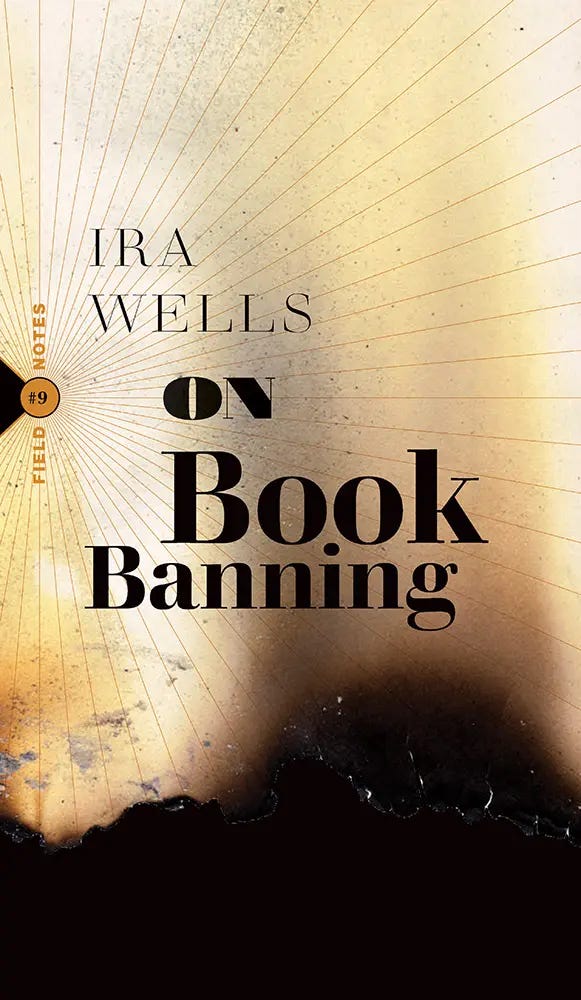On Book Banning by Ira Wells
A lively, accessible survey of literary censorship through the ages.
In recent years, there has been a resurgence in the number of requests to remove certain books from library shelves because of their content, particularly south of the border. This heightens the timeliness of Ira Wells’ On Book Banning, Or, How the New Censorship Consensus Trivializes Art and Undermines Democracy.
Book banning, censorship, and destruction of books are not new ideas. Wells discusses the historical destruction of written materials, noting that “the habitual destruction of libraries throughout human history—book banning in its rawest, most primordial form—points to another universal truth, which is that books represent a threat to despotic power.”
“On Book Banning was a thought-provoking read. Wells is not afraid to pose tough questions or hack through thickets of thorny issues.”
On Book Banning covers a lot of ground, examining historical practices when it comes to book banning, censorship, and the destruction of written materials, discussing various philosophies about expressive freedom, and exploring the motivations of those who are interested in banning books.
Wells describes the ideas of individuals like Benjamin Franklin, who “founded America’s first successful lending library,” John Stuart Mill, whose On Liberty is a key publication about expressive freedom, and Sigmund Freud, who noted a parallel between the way our minds censor our dreams, and censorship in the outside world.
On Book Banning provide examples of how censorship has been applied through the years, citing the case of James Joyce’s 1922 novel Ulysses, which was the focus of a “landmark obscenity case” in the United States. He also discusses Canadian censorship of LGBTQ+ materials in the 1970s and 80s, noting that by 1990 “customs inspectors were detaining for evaluation 75% of the books and magazines shipped to Glad Day Bookshop in Toronto, L’Androgyne in Montreal, and Little Sisters in Vancouver.”
Wells points to some ironies inherent in modern-day efforts to ban books. For one thing, many of the efforts are geared toward books accessible to children and young adults—who are reading less and less. Besides, digital technology has made it possible to reproduce and upload texts, so it’s unlikely banning will eliminate a book’s presence, or keep people from reading it. In fact, in the past, banning a book has often led to a resurgence of interest in the book itself, as people wondered what the fuss was all about.
This doesn’t mean we should consider book banning efforts to be inconsequential. Wells notes that modern-day book-banners don’t see it as a zero-sum game. Today, book banning “works as symbolic practice, as means for the book banners to announce what they would extirpate from the library, and not only from the library.” To would-be book banners, “the school library is a microcosm of the ideal society, and book are levers of social engineering.”
Wells observes that book banning has been cyclical. Factors contributing to its prevalence today include the “widespread erosion of public trust in expertise and public institutions of all kinds,” as well as “the tribalization of political identity and arrival of social media algorithms that exacerbate those divisions.” In addition, “one final factor is necessary for book banning to take off. And that is the erosion of intellectual freedom as a public value.”
The latter point becomes a problem for society, Wells notes. Having access to other peoples’ viewpoints, and listening to those viewpoints, allows us space to realize “we may, in fact, we wrong.” Censorship, Wells argues, “obstructs our one pathway to truth.” He suggests that it’s important to “preserve space for others to contradict and disprove our claims,” and notes that book banners “would not only make our decisions for us, but also deprive us of the opportunity to judge for ourselves.” Wells also discusses how the cultural tug-of-war about what books ought to be available take their toll on librarians.
On Book Banning was a thought-provoking read. Wells is not afraid to pose tough questions or hack through thickets of thorny issues. On Book Banning provided deeper insight into the topic of book bans and censorship, as well as the reasons these activities find fertile soil in today’s political and cultural climate. For readers concerned about intellectual freedom, On Book Banning is worth a look.
About the Author
Ira Wells was born in Lethbridge, Alberta in 1981. He serves as Academic Programs Director of Victoria College in the University of Toronto and teaches in the Northrop Frye stream in literature and humanities in the Vic One program.
His writing has appeared in The Guardian, The New Republic, The Walrus, The Globe and Mail, Literary Review of Canada, Los Angeles Review of Books, American Quarterly, Popular Music and Society, and many other publications.
About the Reviewer
Lisa Timpf lives in Simcoe, Ontario, where she writes poetry, book reviews, short stories, and creative nonfiction. Lisa’s speculative poetry collections Cats and Dogs in Space (2025) and In Days to Come (2022) are available from Hiraeth Publishing. Lisa is a member of SF Canada and the Science Fiction and Fantasy Poetry Association. You can find out more about Lisa’s writing projects at http://lisatimpf.blogspot.com/. Lisa is also on Bluesky, @lisatimpf.bsky.social
Book Details
Publisher: Biblioasis
Language: English
Print length:184 pages
ISBN-10: 1771966637
ISBN-13: 978-1771966634




